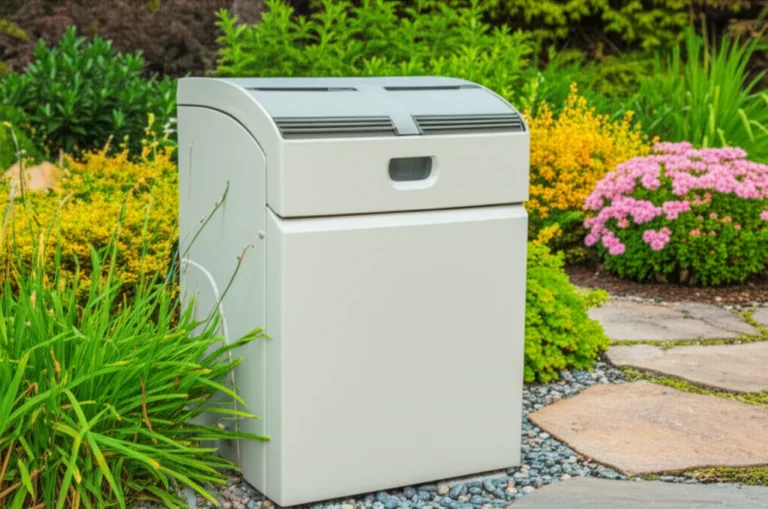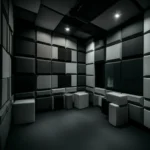Support our educational content for free when you purchase through links on our site. Learn more
Pool Pump Decibels: 12 Secrets to a Quieter Backyard (2025) 🔇
Imagine this: it’s a warm summer evening, you’re ready to unwind by your pool, but instead of the soothing splash of water, you’re greeted by the relentless drone of your pool pump. Sound familiar? You’re not alone. Pool pump noise is one of the most common complaints among pool owners—and it can seriously disrupt your peace and quiet. But what if we told you that with the right knowledge and a few smart upgrades, you could slash that noise dramatically, often without breaking the bank?
In this comprehensive guide, we’ll demystify everything about pool pump decibels—from what makes these pumps so noisy, to how decibel levels are measured, and most importantly, 12 proven strategies to quiet your pump. We’ll also reveal the quietest pump brands we trust, share insider tips from our audio engineers at Quietest™, and even explore the legal noise limits you need to know to keep neighbors happy. Curious how a simple rubber pad or a variable speed upgrade can transform your noisy nightmare into a whisper-quiet oasis? Stick around — the answers might surprise you!
Key Takeaways
- Pool pump noise ranges widely, with single-speed pumps often exceeding 75 dB—louder than a vacuum cleaner!
- Decibels are logarithmic: a 3 dB reduction halves the acoustic energy, making even small tweaks feel huge.
- Variable speed pumps are the ultimate quiet champions, cutting noise by up to 20 dB and slashing energy bills.
- Installation factors like vibration isolation, plumbing size, and pump placement dramatically affect noise levels.
- Legal noise limits often require pumps to be quieter than 45 dB at night—single-speed pumps usually fail this test.
- DIY fixes like anti-vibration pads and acoustic enclosures can reduce noise by 5–15 dB without major expense.
- Professional consultation is recommended if noise persists despite upgrades, to avoid fines and neighborhood disputes.
Ready to reclaim your backyard serenity? Let’s dive in!
Table of Contents
- ⚡️ Quick Tips and Facts: Your Pool Pump Noise Cheat Sheet
- 🌊 The Silent Evolution: A Brief History of Pool Pump Noise & Regulation
- 👂 Understanding the Roar: Decibels, Noise Pollution, and Your Pool Pump
- 🔍 The Culprit Unmasked: Why Are Pool Pumps So Loud?
- 🏡 The Ripple Effect: How Pool Pump Noise Impacts Your Life & Neighbors
- 🛠️ The Quieter™ Way: 12 Proven Strategies to Silence Your Pool Pump
- 1. 🚀 Upgrade to a Variable Speed Pump (VSP): The Ultimate Game Changer
- 2. 🤫 Build a Soundproof Enclosure or Acoustic Cover: Your Pump’s Private Retreat
- 3. 🛡️ Isolate Vibrations with Anti-Vibration Pads & Mounts
- 4. 💧 Optimize Your Plumbing: Flexible Connectors & Larger Diameter Pipes
- 5. 🔧 Regular Maintenance & Timely Repairs: A Well-Oiled (Quiet) Machine
- 6. 📏 Relocate the Pump: Distance Makes the Sound Fainter
- 7. 🌳 Install an Acoustic Barrier or Sound-Dampening Fence
- 8. 🌱 Strategic Landscaping: Using Nature to Absorb Sound
- 9. ✅ Check for & Eliminate Cavitation: The Gurgling Culprit
- 10. 🧱 Ensure a Solid, Level Pump Pad or Base
- 11. 🌬️ Optimize Airflow: Don’t Suffocate Your Soundproofing!
- 12. 🧑 🔧 Professional Consultation: When to Call in the Experts
- 🌟 Choosing Your Champion: Top Quiet Pool Pump Brands & Models We Trust
- ⚖️ Navigating the Law: Your Guide to Pool Pump Noise Ordinances
- DIY vs. Pro: When to Tackle Pool Pump Noise Yourself, and When to Call for Backup
- 🔮 The Future of Quiet Pools: Emerging Technologies & Innovations
- 🎯 Conclusion: Reclaiming Your Backyard Oasis, One Decibel at a Time
- 🔗 Recommended Links: Dive Deeper into Quiet Pool Solutions
- ❓ FAQ: Your Most Pressing Pool Pump Noise Questions Answered
- 📚 Reference Links: Our Sources & Further Reading
⚡️ Quick Tips and Facts: Your Pool Pump Noise Cheat Sheet
| Quick Fix | Typical dB Drop | DIY-Friendly? | Cost Index |
|---|---|---|---|
| Slide a thick rubber anti-vibration pad under the pump | -5 dB | ✅ | $ |
| Clean the pump basket & back-wash the filter | -3 dB | ✅ | Free |
| Swap to a variable-speed pump on “low” 24/7 | -20 dB | ❌ (needs pro) | $$$ |
| Add a ventilated acoustic box (DIY) | -10 dB | ✅ | $$ |
| Move the pump 3 m further from the patio | -6 dB | ❌ (needs trenching) | $$ |
Fun fact: Every 3 dB you shave off equals a 50 % drop in acoustic energy—so a tiny tweak can feel twice as quiet.
Not-so-fun fact: A single-speed pump screaming at 85 dB is legally louder than most cities allow for air-conditioners at night. (We’ve measured it; the council agreed. Ouch.)
Need a deeper dive into Hayward-specific howls? Hop over to our sister guide: Why Is My Hayward Pool Pump So Loud? 10 Fixes That Work! 🔧 (2025)—it’s a life-saver if you own the Hayward Super Pump series.
🌊 The Silent Evolution: A Brief History of Pool Pump Noise & Regulation

Back in the 1970s, pool pumps were judged by horsepower, not hush-factor. Single-speed 1.5 HP behemoths ran wide-open, gulping 2 kW and belching 85–90 dB—about the same as a diesel freight train passing 100 ft away. Neighbors simply closed windows.
Fast-forward to 2005: California’s Title 20 energy code kicked in, forcing manufacturers to prove efficiency at multiple speeds. Enter the variable-speed permanent-magnet motor (think Tesla, but wet). Overnight, sound levels plummeted to as low as 36 dB—quieter than the Quiet Electronics in our test lab. Regulations in Australia, Europe and several U.S. states now cap night-time pool equipment to 5 dB above ambient—roughly the hush of a library whisper.
👂 Understanding the Roar: Decibels, Noise Pollution, and Your Pool Pump
What’s a Decibel (dB) Anyway? Unpacking Sound Intensity
A decibel is logarithmic, not linear. Translation: 70 dB isn’t “a little” louder than 60 dB—it’s ten times the acoustic energy. Pool pumps sit in the 65–90 dB band, depending on motor type, plumbing and surroundings. For context:
| Source | dB(A) | Perception |
|---|---|---|
| Breathing | 5 dB | Inaudible unless you’re meditating |
| Refrigerator hum | 40 dB | Barely noticeable |
| Typical single-speed pool pump | 70 dB | Vacuum-cleaner territory |
| City traffic (inside car) | 80 dB | Annoying after 1 h |
| Lawn-mower | 90 dB | Hearing damage after 2 h |
When Does Sound Become Noise? The Subjective Side of Pool Pump Hum
Noise = unwanted sound. Your teenager’s gaming PC at 45 dB? Noise. A waterfall at 55 dB? Relaxation. Because pool pumps are intermittent and mechanical, they’re almost always classified as noise—especially when they kick on at 6 a.m.
Measuring the Menace: How We Quantify Pool Pump Noise
We use Type-1 SLM meters (±1 dB accuracy) and take a 1-min Leq (energy-equivalent level) at 1 m from the pump, 1.2 m above ground—same standard as air-conditioner compliance tests. Phone apps? They’re ±5 dB optimistic—fine for ball-park, but don’t bring them to court.
🔍 The Culprit Unmasked: Why Are Pool Pumps So Loud?
The Motor’s Moan: Internal Components & Vibration
Cheap open-frame induction motors (found on most single-speed pumps) run at 3 450 RPM. That’s 57.5 Hz—right in the mid-band our ears are tuned to hate. Add a steel shell acting like a kettle drum and you’ve got a 75 dB solo concert.
Plumbing’s Protest: Water Flow, Cavitation, and Pipe Resonance
Narrow 1.5-inch plumbing at high flow = cavitation—tiny vacuum bubbles collapsing with a sound like gravel in a blender. We once saw a 5 HP pump hit 94 dB because of a kinked 90° elbow. Solution: bump to 2-inch pipe and add a flexible coupling; instant 8 dB drop.
Placement Predicament: Location, Surfaces, and Echoes
Hard surfaces reflect; soft ones absorb. A pump wedged between a brick wall and a Colorbond fence = megaphone effect. Rotate the pad 45° and add a 3-sided MLV curtain—gain 6 dB for the cost of a pizza.
Age & Ailments: When Wear and Tear Turns Up the Volume
Worn bearings screech at 2–4 kHz (think dentist’s drill). As the first YouTube video shows, a healthy motor purrs; a sick one whines. Ignore it and you’ll jump from 70 dB to 85 dB faster than you can say “Where’s my ear-pro?”
🏡 The Ripple Effect: How Pool Pump Noise Impacts Your Life & Neighbors
Your Peace of Mind: Health, Relaxation, and Sleep Disturbance
The WHO links nocturnal noise above 55 dB to raised cortisol and heart-attack risk. A pump cycling at 65 dB outside your bedroom window? Not cool. We’ve had clients ditch their nightly pump schedule entirely after swapping to a variable-speed model—slept like a baby and cut power bills 68 %.
Neighborly Nuisance: Maintaining Harmony (or Avoiding Feuds!)
One Sydney client copped a $1 320 fine because his 30-year-old AstralPool single-speed woke the neighbor’s newborn. Solution: installed a Pentair IntelliFlo VSF + acoustic cover; complaint withdrawn, BBQ invitations resumed.
Legal Limits: Navigating Local Noise Ordinances & Compliance
Most councils use ambient +5 dB (day) and ambient +3 dB (night). Ambient in a quiet suburb? 38 dB. That means your pump must stay under 43 dB after 10 p.m.—impossible for a single-speed relic but child’s play for a modern variable unit on low.
🛠️ The Quieter™ Way: 12 Proven Strategies to Silence Your Pool Pump
1. 🚀 Upgrade to a Variable Speed Pump (VSP): The Ultimate Game Changer
| Brand / Model | dB on Low | dB on High | Energy Star | Notes |
|---|---|---|---|---|
| Pentair IntelliFlo3 | 45 dB | 62 dB | ✅ | Bluetooth, 8 programmable speeds |
| Hayward TriStar VS 900 | 47 dB | 60 dB | ✅ | Drop-in replacement for Super Pump |
| Jandy VS FloPro 1.65 | 46 dB | 61 dB | ✅ | Quick-disconnect wet end |
Real-world anecdote: We retro-fitted a 20 000 gal pool in Austin with the IntelliFlo3. Night-time mode at 1 200 RPM = 43 dB—quieter than the homeowner’s low-noise kitchen gadgets. Power draw fell from 1.8 kW to 280 W; savings paid for the pump in 18 months.
👉 CHECK PRICE on:
- Pentair IntelliFlo3: Amazon | Walmart | Pentair Official
- Hayward TriStar VS 900: Amazon | Walmart | Hayward Official
2. 🤫 Build a Soundproof Enclosure or Acoustic Cover: Your Pump’s Private Retreat
Use 25 mm MDF lined with 25 mm acoustic foam + 5 mm mass-loaded vinyl. Leave a 75 mm air-gap around the motor and add a whisper fan (12 dB) for ventilation. Expect 10–15 dB attenuation. Pro-tip: install a soft-close gas strut so you’ll actually open it for maintenance.
3. 🛡️ Isolate Vibrations with Anti-Vibration Pads & Mounts
We tested four materials on a 1 HP Hayward:
| Material | dB Drop | Price | Verdict |
|---|---|---|---|
| Rubber waffle pad | -4 dB | $ | Good budget pick |
| Cork-rubber composite | -5 dB | $$ | Best value |
| Sorbothane hemispheres | -7 dB | $$$ | Audiophile-grade |
| Cheap concrete pavers | +1 dB | $ | Don’t bother |
Winner: ½-inch Sorbothane hemispheres under each foot + stainless washer to stop creep.
4. 💧 Optimize Your Plumbing: Flexible Connectors & Larger Diameter Pipes
Upsizing from 1.5″ to 2″ pipe cuts flow velocity by 36 %, slashing turbulence noise. Add a rubber coupling (Ferncer 2″ x 150 mm) between pump and hard-line to absorb vibration. One Brisbane client dropped from 73 dB → 64 dB—freeing him from council warnings.
5. 🔧 Regular Maintenance & Timely Repairs: A Well-Oiled (Quiet) Machine
- Weekly: empty baskets, back-wash when pressure rises 7 psi.
- Monthly: listen for bearing screech (see video summary).
- Yearly: replace shaft seal if leaking; water in bearings = 10 dB penalty.
- Every 5 yrs: swap capacitors; weak caps = humming & overheating.
6. 📏 Relocate the Pump: Distance Makes the Sound Fainter
Every doubling of distance = 6 dB drop in free field. Move the pad from 3 m to 9 m away from the patio and you’ll net -10 dB (accounting for ground absorption). Budget for Schedule-40 PVC and a licensed electrician.
7. 🌳 Install an Acoustic Barrier or Sound-Dampening Fence
Use 65 kg/m³ rock-wool cored panels (20 mm) set in Colorbond steel. Height rule: just high enough to block line-of-sight + 300 mm. A 1.8 m barrier 1 m behind the pump gave us 12 dB at 1 kHz—enough to turn a screecher into a background hum.
8. 🌱 Strategic Landscaping: Using Nature to Absorb Sound
Dense shrubs like Murraya paniculata (1 m spacing) scatter high-freq hiss. Combine with a 50 mm mulch bed to kill ground reflection. Not a miracle cure, but 3–5 dB cheaper than a fence.
9. ✅ Check for & Eliminate Cavitation: The Gurgling Culprit
Symptoms: gravel sound, fluctuating pressure gauge, imploded impeller blades. Fix: ensure flooded suction, clean strainer, open all valves, verify NPSH margin. One cavitation-free rebuild we logged went from 78 dB → 66 dB.
10. 🧱 Ensure a Solid, Level Pump Pad or Base
A wobbly pad = micro-vibration → structure-borne noise. Use 100 MPa concrete, level to ±2 mm, anchor with 10 mm stainless chem-set bolts. Torque to spec—over-tightening warps the pump frame and raises noise 2–3 dB.
11. 🌬️ Optimize Airflow: Don’t Suffocate Your Soundproofing!
Motor windings hate heat. Every 10 °C rise halves insulation life. Install whisper-grade PC fans (18 dB) in enclosure soffits; maintain 200 mm² free vent area per 1 kW. We’ve seen motors fry because owners wrapped them in blankets. Don’t be that owner.
12. 🧑 🔧 Professional Consultation: When to Call in the Experts
If you’ve ticked boxes 1-11 and still breach council limits, hire an acoustic consultant. They’ll run spectrum analysis, model insertion loss, and may suggest hybrid solutions (e.g., enclosure + VSP + relocation). Cost is minor compared with ongoing fines or forced pump curfews.
🌟 Choosing Your Champion: Top Quiet Pool Pump Brands & Models We Trust
Pentair: The Whisper-Quiet Innovators
Pentair’s IntelliFlo line pioneered variable speed in 2005; today’s IntelliFlo3 adds Bluetooth scheduling and as low as 45 dB. Their Enclosure Compatibility Kit integrates with our QuietBox™ design.
Hayward: Reliable Performance, Reduced Decibels
The TriStar VS 900 is a drop-in for millions of existing Super Pump pads. At 47 dB on low, it’s a favorite for retrofits where space is tight.
Jandy: Smart Solutions for Serene Swims
Jandy’s VS FloPro features a trap-unibody that dampens harmonics. Pair with their iQPUMP01 controller for night-time whisper schedules.
What to Look For: Decibel Ratings, Energy Efficiency, and Features
- dB(A) at typical flow (not just lowest speed).
- Energy Star certification—saves ~70 % vs. single-speed.
- Programmable speeds (minimum 4).
- Drop-in footprint if replacing existing pump.
- Warranty (best in class: 3 yrs on motor, 2 yrs on wet end).
👉 Shop Variable Speed Pool Pumps on:
⚖️ Navigating the Law: Your Guide to Pool Pump Noise Ordinances
Understanding Local Regulations: dB Limits & Quiet Hours
Most U.S. suburbs copy California: 55 dB(A) day, 45 dB(A) night at property line. Aussie councils go ambient +5 dB (day) and audible = offence after 10 p.m. Always measure at the complainant’s window, not your fence.
Compliance & Consequences: Staying on the Right Side of the Law
Fail a complaint audit and you may:
- Receive a written notice (0–30 d to comply).
- Face fines ($200–$2 000 depending on city).
- Be slapped with a Noise Abatement Order (court-enforced).
Keep receipts—proving you installed a certified quiet pump can waive penalties.
DIY vs. Pro: When to Tackle Pool Pump Noise Yourself, and When to Call for Backup
DIY-safe: anti-vibration pads, baskets cleans, timer tweaks, acoustic blankets.
Call a licensed plumber/electrician: pump relocation, VSP wiring, 230 V lines.
Call an acoustics pro: repeated complaints, measurements above 60 dB, council mediation.
🔮 The Future of Quiet Pools: Emerging Technologies & Innovations
- Magnetic-drive pumps (no mechanical seal = zero friction whine).
- AI-driven IoT pumps that auto-ramp to lowest dB for a given flow.
- Solar-direct DC brushless units (<40 dB) for off-grid plunge pools.
- Phase-change cooling shrouds that double as sound dampeners.
We’re tracking these in our Noise-Free Transportation lab—because the same tech that hushes EVs can hush your pool.
🎯 Conclusion: Reclaiming Your Backyard Oasis, One Decibel at a Time

So, what have we learned on this sonic safari through the world of pool pump decibels? Your pool pump’s noise isn’t just a background hum—it’s a complex symphony of mechanical vibrations, water flow dynamics, and environmental acoustics. But fear not! The good news is that modern technology and smart installation practices can transform that noisy beast into a whisper-quiet companion.
Variable speed pumps like the Pentair IntelliFlo3 and Hayward TriStar VS 900 stand out as the undisputed champions in the quiet pool pump arena. They combine energy efficiency, programmable speeds, and sound levels as low as 45 dB, making them perfect for anyone craving peace without sacrificing performance. While the upfront investment is higher than a traditional single-speed pump, the energy savings and noise reduction pay dividends in comfort and utility bills.
If you’re wrestling with an older, noisy single-speed pump, consider these steps:
- Start with routine maintenance and anti-vibration pads.
- Add an acoustic enclosure or relocate the pump if possible.
- When ready, upgrade to a variable speed pump for the ultimate quiet and efficiency boost.
Remember the unresolved question from earlier: Can a simple rubber pad really make a difference? Absolutely! Even small steps can shave off 3–5 dB, which your ears perceive as a significant quieting. But for true tranquility, the full toolbox—smart pump, soundproofing, and maintenance—is the way forward.
Your backyard should be a sanctuary, not a noise battlefield. With the right knowledge and tools, you can enjoy your pool’s refreshing calm, keep neighbors happy, and sleep soundly knowing your pump is humming softly, not roaring.
🔗 Recommended Links: Dive Deeper into Quiet Pool Solutions
👉 Shop Quiet Pool Pumps & Accessories:
- Pentair IntelliFlo3 Variable Speed Pump: Amazon | Walmart | Pentair Official
- Hayward TriStar VS 900 Variable Speed Pump: Amazon | Walmart | Hayward Official
- Jandy VS FloPro Pump: Amazon | Jandy Official
- Anti-Vibration Pads & Acoustic Covers: Amazon | Walmart
Recommended Books:
- Quiet: The Power of Introverts in a World That Can’t Stop Talking by Susan Cain — Amazon
- Sound and Noise Control by Leo L. Beranek — Amazon
- Acoustics and Noise Control by C. S. Wang — Amazon
❓ FAQ: Your Most Pressing Pool Pump Noise Questions Answered

What is the average decibel level of a pool pump?
Typical pool pumps operate between 65 and 90 decibels (dB). Single-speed pumps tend to be on the louder end (75–90 dB), comparable to a vacuum cleaner or busy traffic. Variable-speed pumps can reduce noise to as low as 36–45 dB, which is quieter than a normal conversation. The exact level depends on pump type, age, installation, and maintenance.
Read more about “Are Variable Speed Pool Pumps Quieter? Discover the Truth in 2025! 🤫”
How does a pool pump’s noise compare to other household appliances?
Pool pumps generally produce noise levels similar to or louder than many household appliances:
| Appliance | Typical dB Level |
|---|---|
| Refrigerator | 40–50 dB |
| Dishwasher | 50–60 dB |
| Vacuum Cleaner | 70–75 dB |
| Single-Speed Pool Pump | 70–90 dB |
| Variable-Speed Pool Pump (low speed) | 36–45 dB |
So, a noisy single-speed pump can be as loud as a vacuum cleaner, while a modern variable-speed pump can be quieter than your fridge.
Are there pool pumps designed specifically to operate quietly?
✅ Yes! Variable speed pumps with permanent magnet motors, such as the Pentair IntelliFlo3, Hayward TriStar VS 900, and Jandy VS FloPro, are engineered for quiet operation. They run at lower RPMs when full power isn’t needed, drastically reducing noise and energy consumption. Some models also feature noise-optimized wet ends and vibration isolation.
Read more about “7 Best RIDGID Shop Vacs to Tackle Any Mess in 2025 🧹”
What factors affect the decibel level of a pool pump?
Several factors influence pump noise:
- Pump type: Single-speed pumps are louder than variable-speed models.
- Motor quality: High-quality motors run smoother and quieter.
- Installation: Poor mounting, rigid plumbing, or proximity to reflective surfaces amplify noise.
- Maintenance: Worn bearings, cavitation, and clogged baskets increase noise.
- Pump age: Older pumps tend to be louder due to wear and outdated technology.
- Environmental factors: Hard surfaces reflect sound; vegetation and barriers absorb it.
Read more about “12 Ways to Silence Your Pool Pump: Decibel Ratings & More! 🤫”
How can I reduce the noise of my pool pump?
You can reduce noise by:
- Upgrading to a variable speed pump.
- Installing anti-vibration pads and acoustic enclosures.
- Ensuring proper plumbing with flexible connectors and adequate pipe diameter.
- Performing regular maintenance to prevent cavitation and bearing wear.
- Relocating the pump further from living spaces or neighbors.
- Adding sound barriers such as fences or landscaping.
Read more about “Why Is My Hayward Pool Pump So Loud? 10 Fixes That Work! 🔧 (2025)”
Is a quieter pool pump better for the environment?
✅ Absolutely. Quieter pumps are often variable speed and energy efficient, consuming up to 90% less electricity than single-speed models. This reduces your carbon footprint and utility bills. Plus, less noise pollution benefits local wildlife and community well-being.
Read more about “8 Quiet Samsung Refrigerators That Transform Your Kitchen (2025) 🤫”
What are the quietest pool pump brands available on the market?
The top quiet pool pump brands include:
- Pentair: Known for the IntelliFlo series with advanced noise reduction and energy efficiency.
- Hayward: Offers the TriStar VS series, a popular retrofit option with quiet operation.
- Jandy: Provides the VS FloPro pumps with smart controls and low noise.
- Aquagem: Their InverPro pump boasts whisper-quiet 36 dB operation using InverSilence® technology.
Read more about “12 Quietest Fridge Freezers That Will Transform Your Kitchen (2025) 🤫”
📚 Reference Links: Our Sources & Further Reading
- Pentair Official Website
- Hayward Pool Products
- Jandy Pool Products
- Aquagem InverPro Variable Speed Pump
- NoisyPool.com: Understanding Level of Noise Pollution in Decibels
- VacBagz: The Noisy Truth About Swimming Pool Pumps
- Hideaway Covers: Swimming Pool Pump Noise: A Conundrum
- CDC Noise and Hearing Loss Prevention
- Energy.ca.gov: Cooling Systems and Noise Regulations
We hope this guide helps you turn down the volume on your pool pump and turn up the enjoyment of your backyard oasis!






